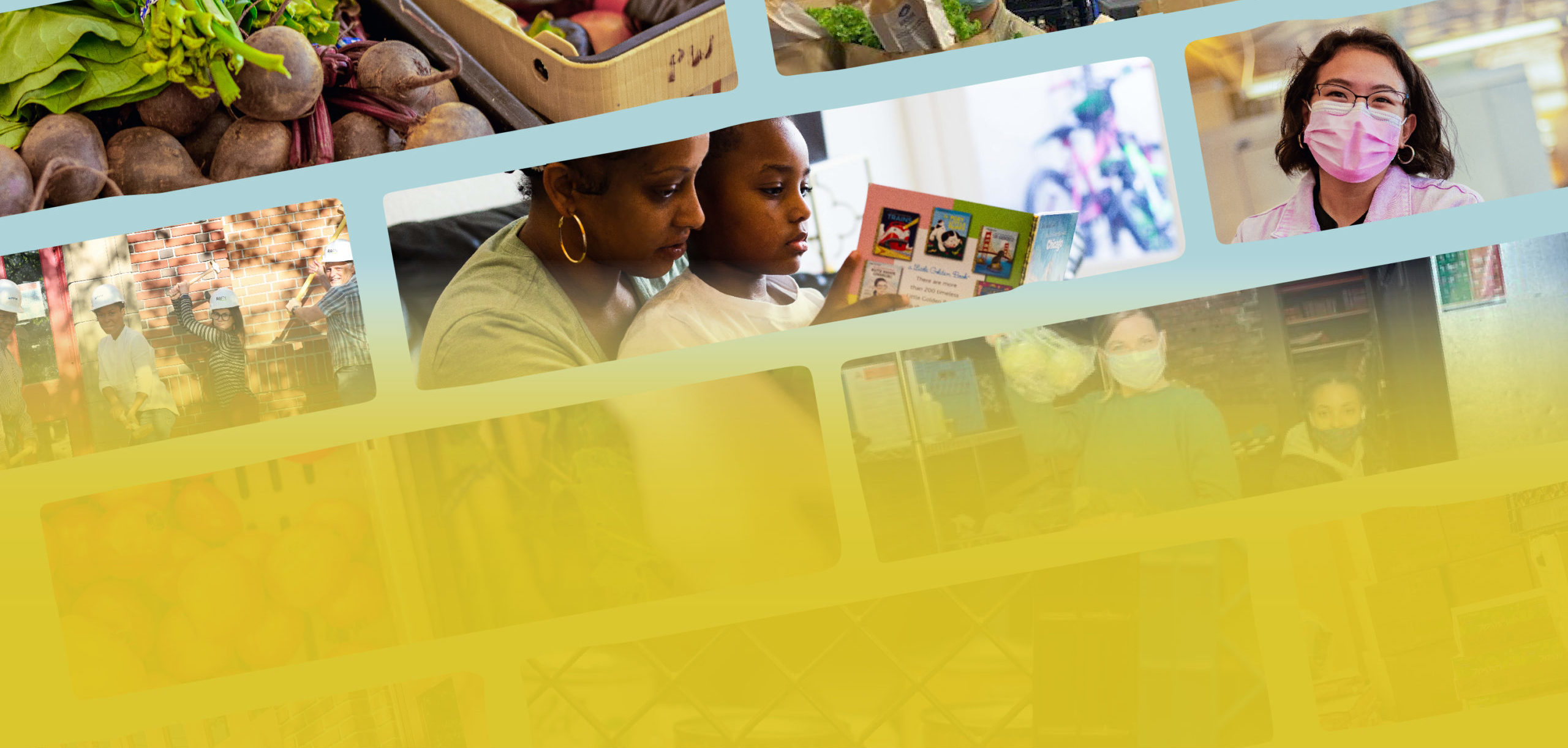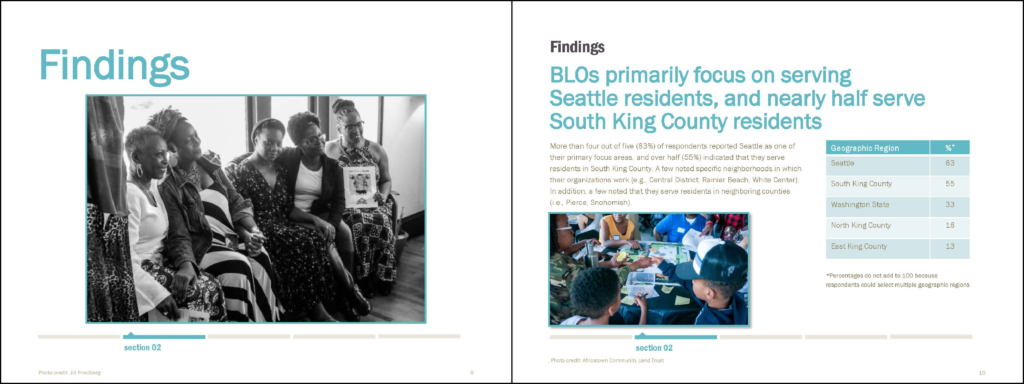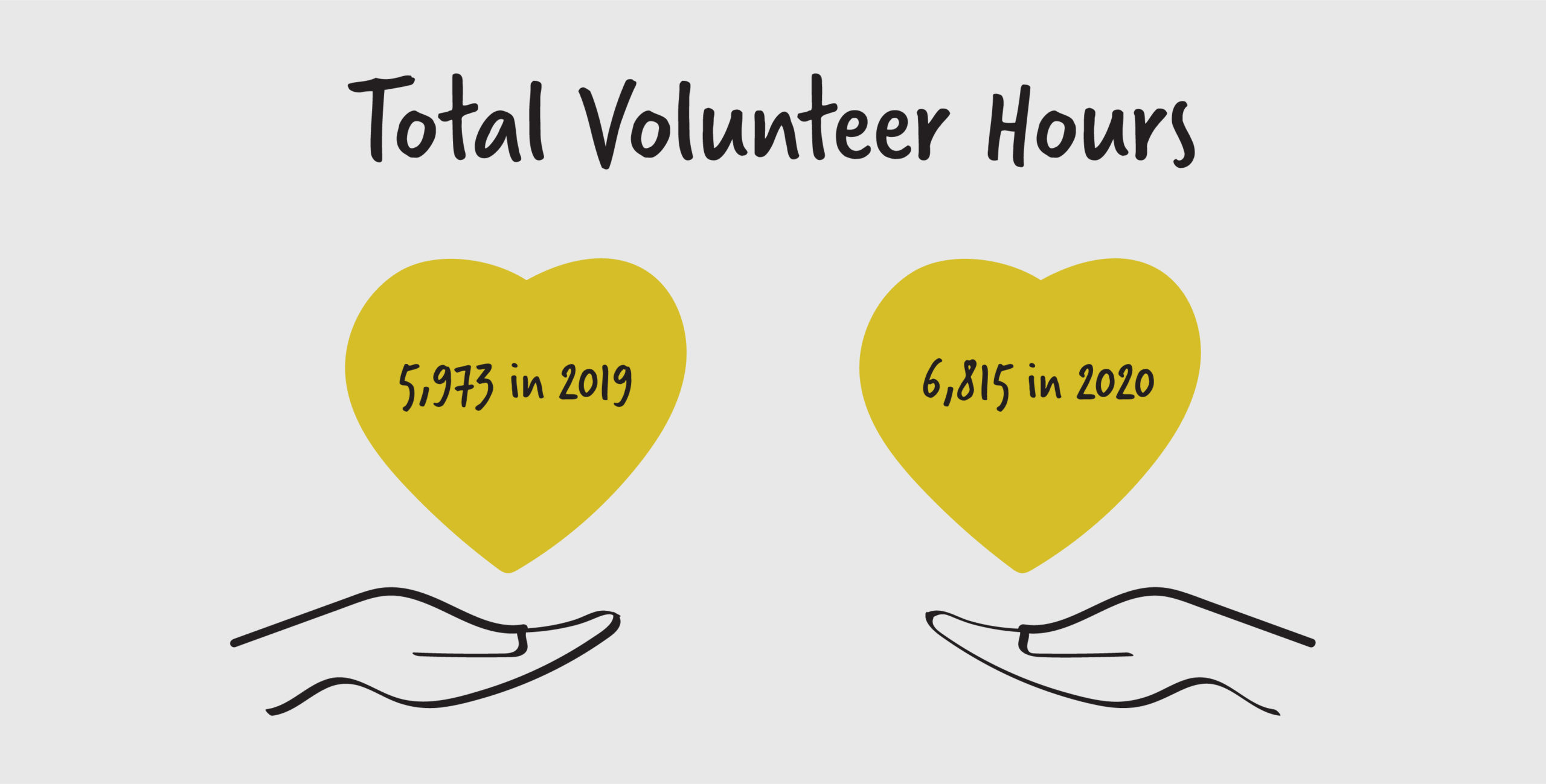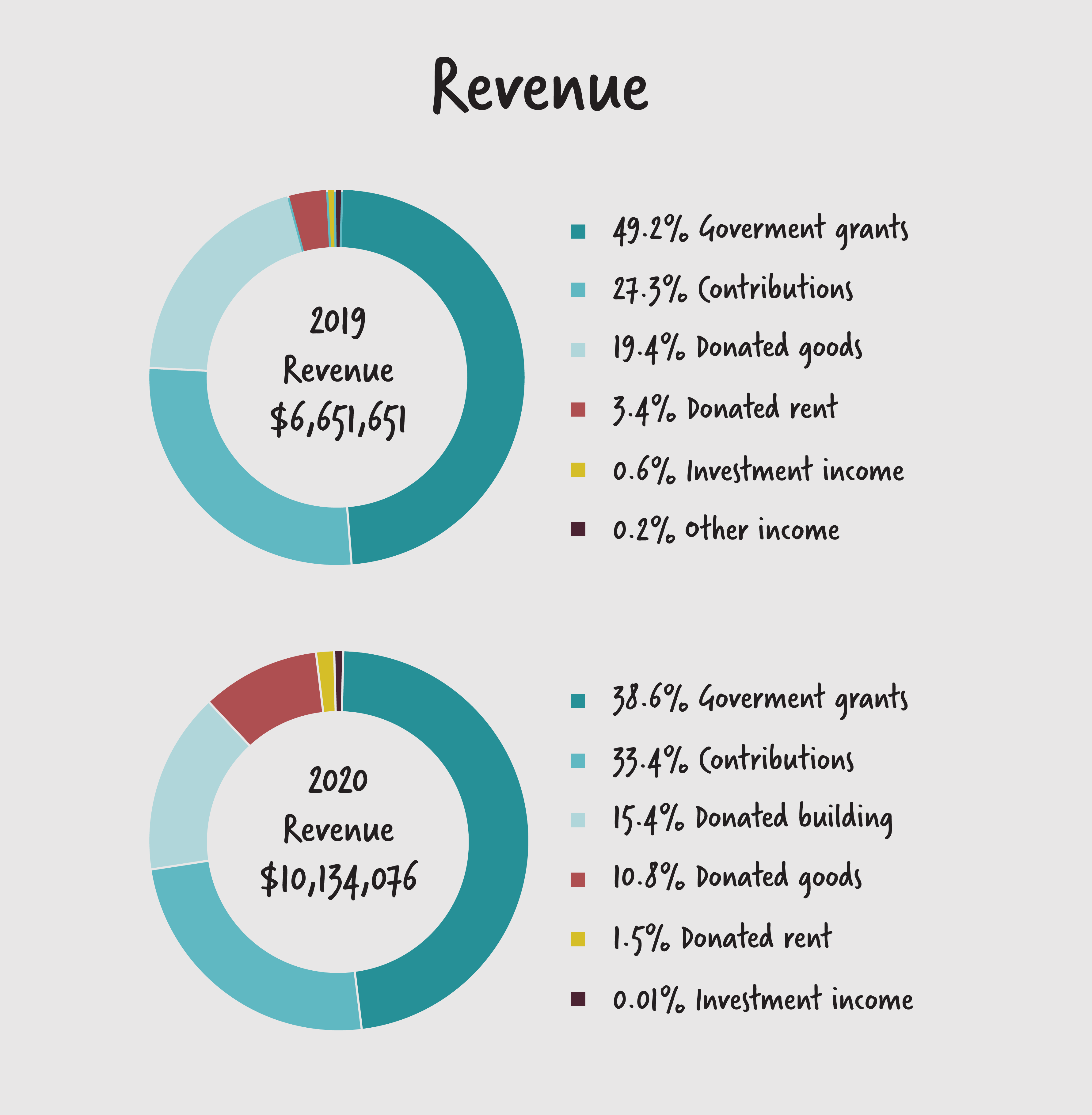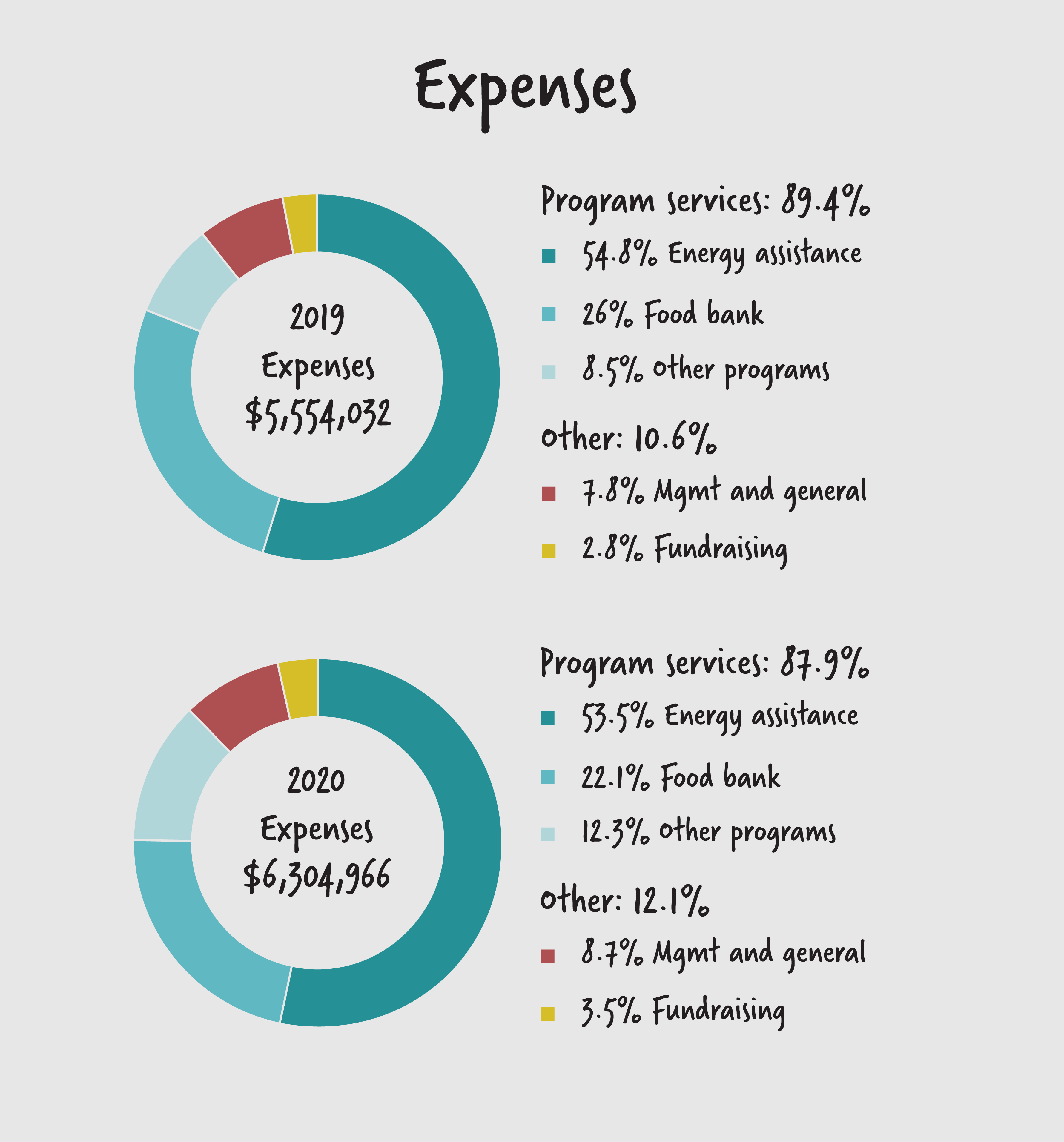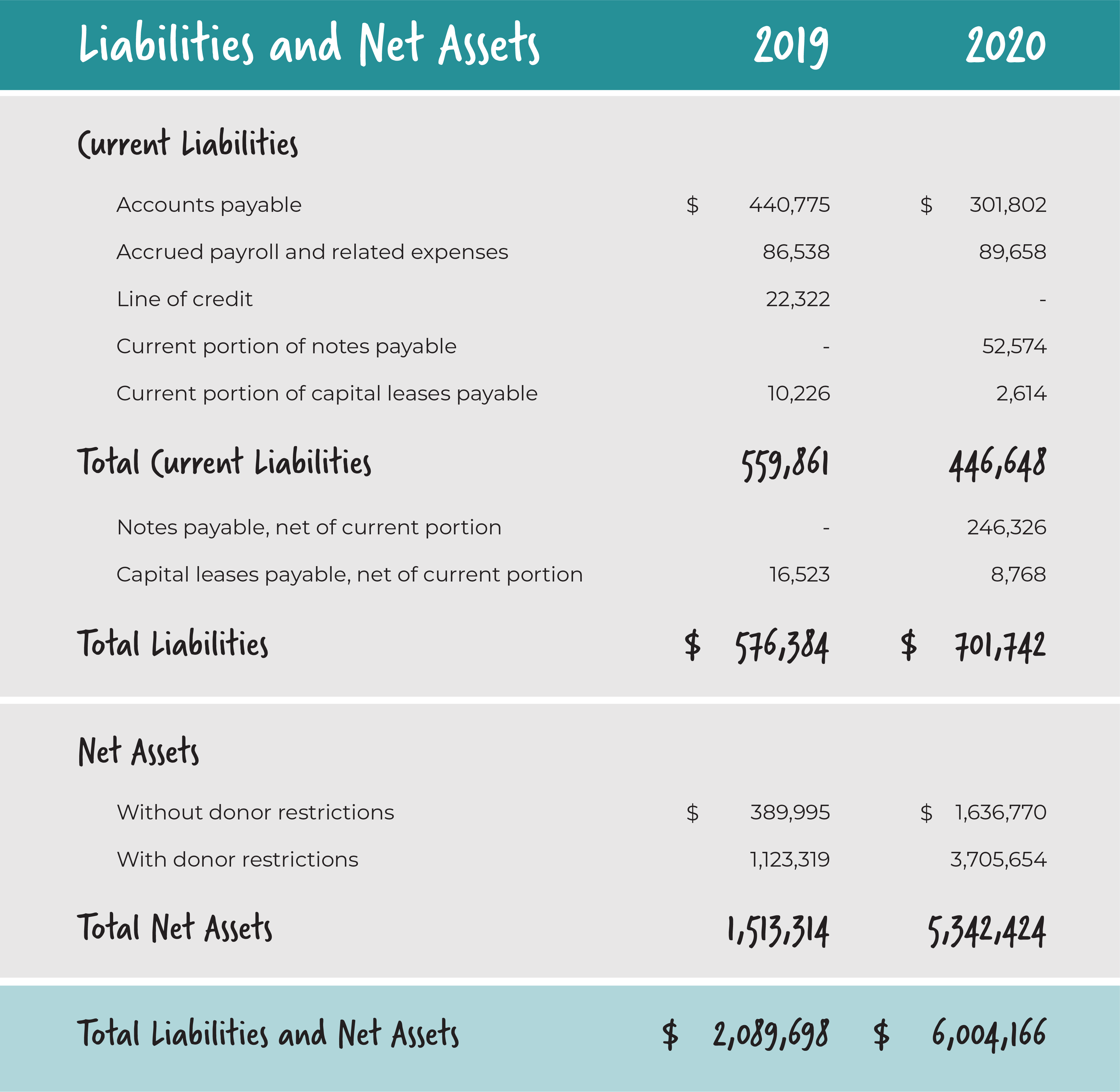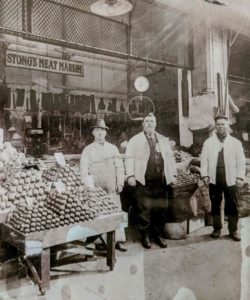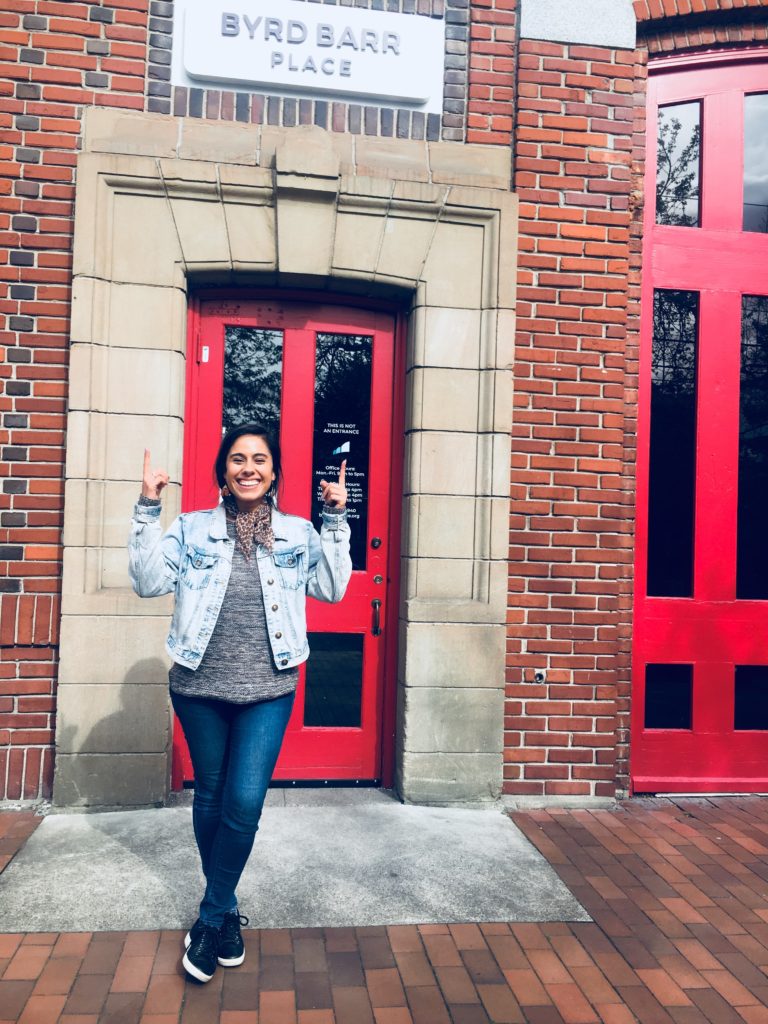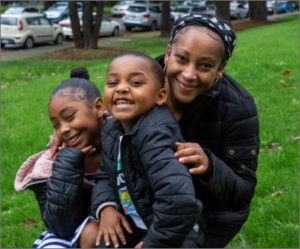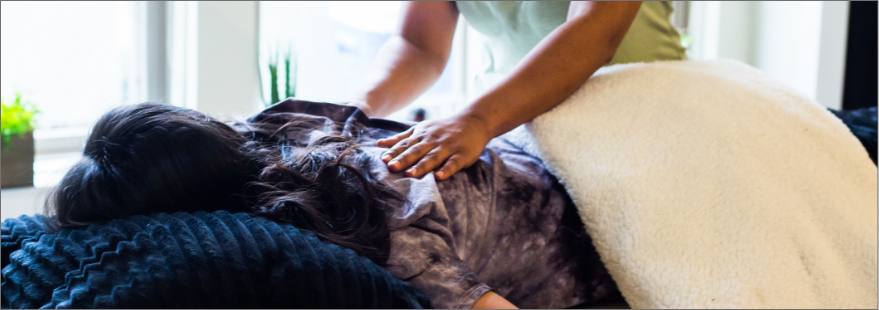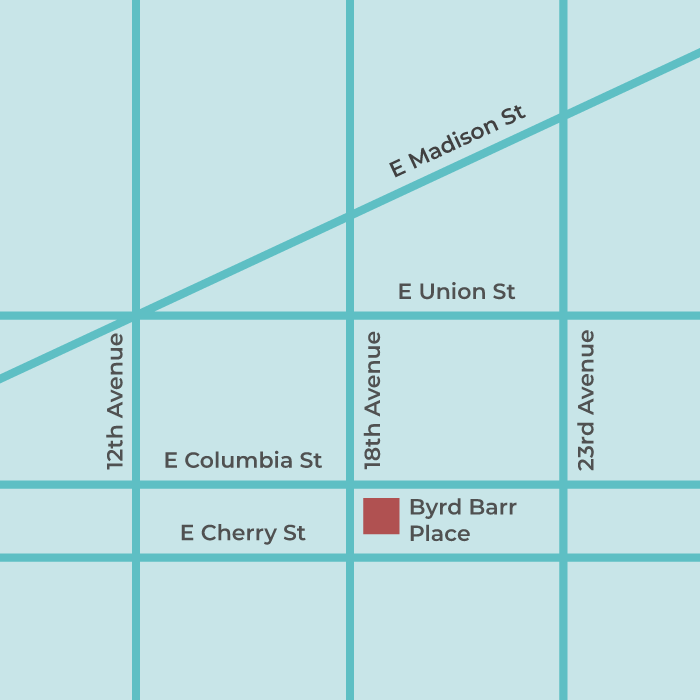Dear Friends,
“It is in collectivities that we find reservoirs of hope and optimism.” ~Angela Davis
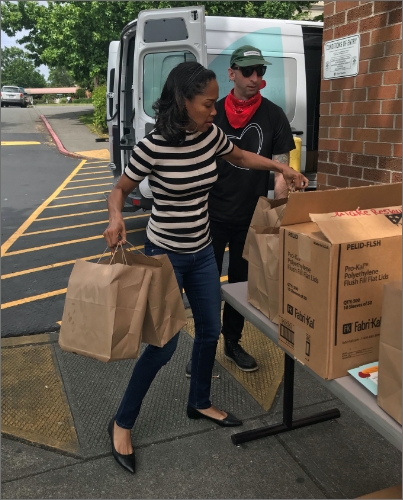 Together, we are Byrd Barr Place. We are a community — of individuals and families striving to make ends meet, of staff and volunteers helping our neighbors, of donors and community partners fueling our mission. In our collectiveness, we are making progress toward an equitable future.
Together, we are Byrd Barr Place. We are a community — of individuals and families striving to make ends meet, of staff and volunteers helping our neighbors, of donors and community partners fueling our mission. In our collectiveness, we are making progress toward an equitable future.
We were founded as the Central Area Motivation Program (CAMP) during the civil rights movement in 1964, when Black people and allies were fighting for justice and equality in Seattle and around the country. At the time, Americans were also experiencing the highest poverty rates since the Great Depression. We became a community action agency and are still one today. In fact, we are the oldest community-inspired organization in the country.
More than 55 years later, we are just as committed to our mission of empowering people to live healthy, prosperous lives. Our fight for civil rights continues to intersect with our efforts to support people in poverty. Our programs and services continue to intersect with our community engagement and advocacy, which, in turn, shape our programs and services. All of these parts of our work join together in a common purpose of equity.
These past two years, our neighbors have faced unbelievable challenges. The COVID-19 pandemic, economic recession, and reckoning with racial injustice have not affected people equally. Black, Indigenous, and other people of color bear the brunt of these compounding crises. We have seen demand for our services more than double, and the need for structural change become ever more urgent.
Thank you to everyone who has stood by us and with us as we’ve navigated these challenges — while keeping our doors open, helping our neighbors stay sheltered and warm with food on their tables, supporting our local businesses, and advocating for policy change. Our community has also stepped up to fund the renovation of our historic firehouse home, which we “broke ground” for in 2021.
Knowing that we, as one community, are here for one another at Byrd Barr Place, I remain full of hope and optimism. While times have challenged us, and we’ve dipped into our reservoirs, we’ve witnessed our collective reservoirs overflowing by the generosity of our Byrd Barr Place community. In our collectiveness, we are strong, we are confident, we are creating an equitable future.
In community,
We’re Here
At Byrd Barr Place, we envision strong communities, where all people have access to basic human needs to propel their health, well-being, and prosperity. Throughout 2019 and 2020, we kept essential services running — food, shelter, warmth, and financial tools — and worked to meet the growing needs of our neighbors in Seattle and King County.
FOOD BANK
The Food Bank continued to be open three days a week and carry high-quality healthy food, household, and personal care items. With social distancing measures, contact-free home deliveries became a critical service. We purchased a second delivery van, and also relied on volunteers on bikes to make it happen. See Nicole’s story. When elderly volunteers had to stay home amidst the pandemic, members of the National Guard stepped in and ensured the shelves were stocked and ready for clients. In 2020, Byrd Barr Place distributed 539,700 pounds of food to 46,679 households in Seattle, powered by diligent staff and 4,815 hours from volunteers. This was almost a tenfold increase from 2019, with 5,000 households receiving food.
ENERGY ASSISTANCE
Our year-round Energy Assistance Program helped Seattle residents pay for home heating and furnace repair. In 2019, we launched an online application to make it easier for clients — the first-of-its-kind in Washington. It allowed clients to access the application at convenient times, sped up the approval process, and improved record keeping. Learn more in Sabrina’s spotlight. We provided energy assistance for 7,400 households in 2019 and 8,389 households in 2020 to keep the lights on and stay warm.
HOUSING ASSISTANCE
Our Housing Assistance programs enabled renters to avoid eviction and connect to temporary, transitional, or permanent affordable housing. Moving to online client service proved vital as we adapted to changing conditions with the pandemic. We supported 219 households in 2019 and 341 households in 2020 with rental assistance, ensuring people remained housed.
PERSONAL FINANCE
In 2019, Byrd Barr Place served more than over 500 households in King County with classroom training and one-on-one coaching about banking, budgeting, and debt reduction. To adapt to the virtual environment, we have partnered with Capital One, and are looking forward to introducing new virtual support services soon.
COMMUNITY CONNECTOR
Our Community Connector worked with clients to understand their needs and refer them to appropriate services and resources. In 2020, the Community Connector program supported 674 households with application assistance, helping enroll into programs, and referrals to other agencies, compared to 140 households in 2019.
VOLUNTEER SPOTLIGHT
NICOLE BROWN
Every Thursday morning, Nicole Brown connects a trailer of food boxes to her bike and drops off contact-free home deliveries as part of Byrd Barr Place’s volunteer-run program.
VOLUNTEER SPOTLIGHT
NICOLE BROWN
Every Thursday morning, Nicole Brown connects a trailer of food boxes to her bike and drops off contact-free home deliveries as part of Byrd Barr Place’s volunteer-run program.
STAFF SPOTLIGHT
SABRINA ALVAREZ
Sabrina Alvarez works as manager of the Energy Assistance Program, after starting as a client advocate in 2018. Her experience as a frontline staffer informs her vision to make the process for clients as accessible as possible.
STAFF SPOTLIGHT
SABRINA ALVAREZ
Sabrina Alvarez works as manager of the Energy Assistance Program, after starting as a client advocate in 2018. Her experience as a frontline staffer informs her vision to make the process for clients as accessible as possible.
Good Neighbors
Byrd Barr Place has been a vested neighbor in the Central District for more than 55 years. We’ve seen the Central District go from 75 percent Black residents in 1970 to just 15 percent in 2020. To support a future in which Black people, other people of color, and people with low incomes can stay and thrive in the neighborhood, we have partnered with community organizations to combat gentrification and rapid displacement.
COMMUNITY DEVELOPMENT
In March 2019, we celebrated the opening of the Liberty Bank Building, honoring the legacy of the first Black-owned bank that once stood on the site. Made possible by the joint efforts of Byrd Barr Place, Africatown Community Land Trust, the Black Community Impact Alliance, and Community Roots Housing, the new building has 115 affordable homes and three affordable retail spaces on the ground floor for people of color-owned businesses.
LOCAL BUSINESS GRANTS
Soon after the opening, the economic and health impacts of the COVID-19 pandemic began to take hold. Many small, Black-owned businesses were locked out of paycheck protection program loans, lacked access to capital, and had to lay off workers.
We know that business sustainability is critical to a self-sufficient community, and responded with urgency to support 10 Black-owned businesses on the brink of closure with small grants. In turn, several restaurants that received grant funds prepared meals — 700 a week — and our Byrd Barr Place food bank team delivered them to homebound clients in the Liberty Bank Building and houseless neighbors. Read community spotlight about Randy and how Catfish Corner benefitted from business support.
COMMUNITY SPOTLIGHT
RANDY MASSENGALE
Randy Massengale is an entrepreneur, advisor, executive coach, adjunct professor, and visionary. He teaches at Seattle University’s Albers School of Business and Economics, and manages the RAMP-up program, which helps under-resourced businesses build their capacity for thriving in the neighborhood.
COMMUNITY SPOTLIGHT
RANDY MASSENGALE
Randy Massengale is an entrepreneur, advisor, executive coach, adjunct professor, and visionary. He teaches at Seattle University’s Albers School of Business and Economics, and manages the RAMP-up program, which helps under-resourced businesses build their capacity for thriving in the neighborhood.
A Community Launchpad
In the wake of the COVID-19 pandemic and racial reckoning connected to the police brutality against Black bodies, Byrd Barr Place was compelled to support our Black and Brown communities in new ways. With conversations around calls to action with other community leaders, two empowering initiatives were born: the Black Future Co-op Fund and the BIPOC Executive Directors Coalition.
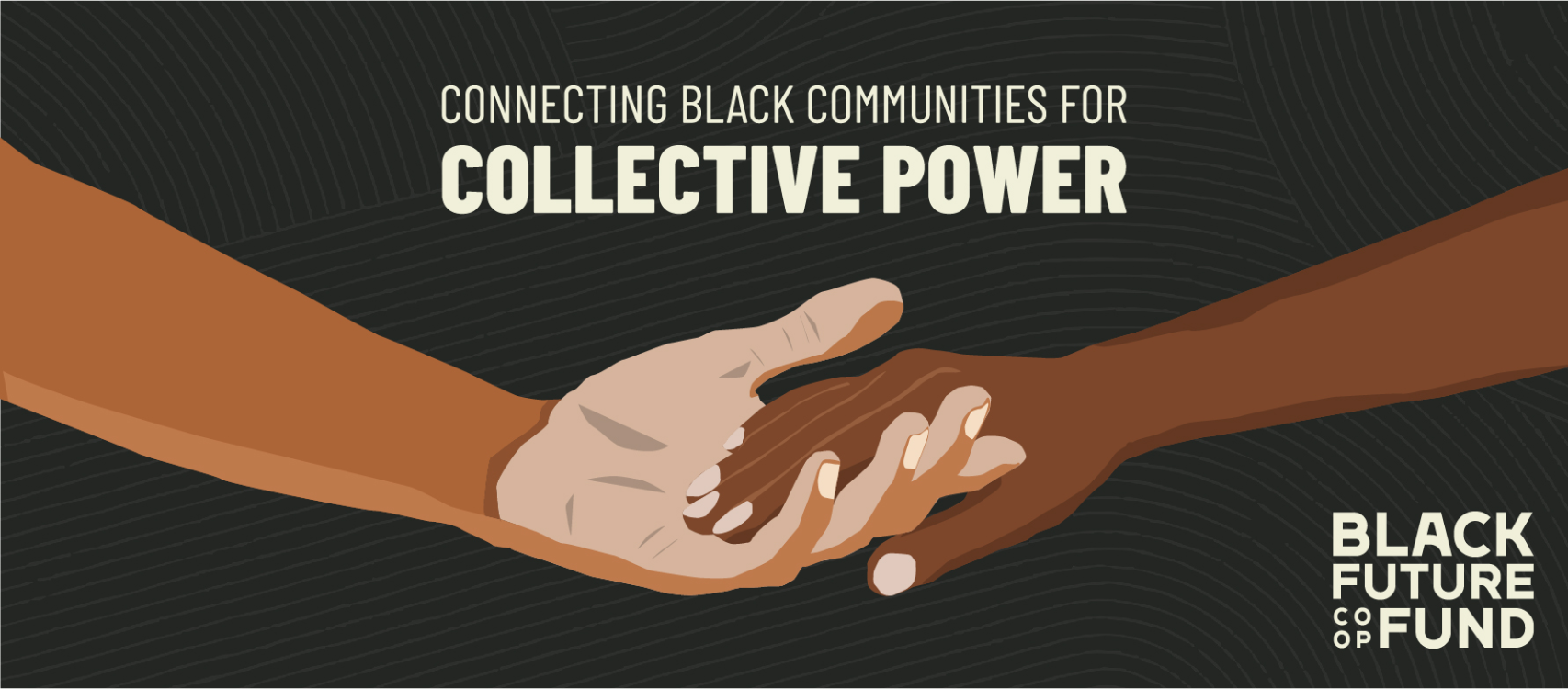 The Black Future Co-op Fund is Washington state’s first cooperative philanthropy created by and for Black people to ignite and sustain Black generational wealth, health, and well-being.
The Black Future Co-op Fund is Washington state’s first cooperative philanthropy created by and for Black people to ignite and sustain Black generational wealth, health, and well-being.
Inspired by the uprising for racial justice, four social change leaders — our own Andrea Caupain Sanderson; Angela Jones, Washington State Initiative director at the Bill & Melinda Gates Foundation; Michelle Merriweather, president and CEO of the Urban League of Metropolitan Seattle; and T’wina Nobles, Washington state senator and president and CEO of the Tacoma Urban League — joined together to launch the Black Future Co-op Fund in June 2020. These four Black co-founders aspire to create a new model of philanthropy anchored in the beauty, soulfulness, and strength of Blackness.
Through the Black Future Co-op Fund, they seek to connect Black communities for collective power, promote a truthful Black narrative, and uplift Black-led solutions that foster Black generational prosperity.
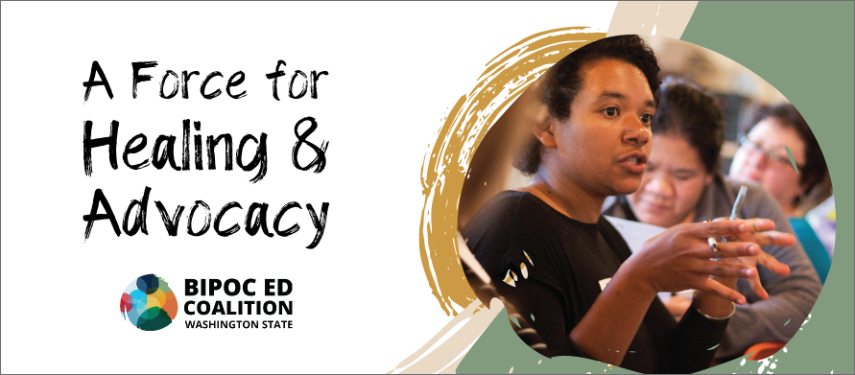 The BIPOC ED Coalition is a multicultural, cross-sector collaborative of 200+ Black, Indigenous, and People of Color (BIPOC) nonprofit leaders working in solidarity to promote wellness and restore resources in communities of color across Washington state.
The BIPOC ED Coalition is a multicultural, cross-sector collaborative of 200+ Black, Indigenous, and People of Color (BIPOC) nonprofit leaders working in solidarity to promote wellness and restore resources in communities of color across Washington state.
Founded by changemakers Ananda Valenzuela, co-executive director of RVC; Jodi Nishioka, executive director of Communities Rise; Victoria Santos, director of Center for Healing and Liberation; and again, our own Andrea Caupain Sanderson, CEO of Byrd Barr Place, the coalition is a big tent for healing together, uniting around a shared agenda, and mobilizing for equitable change. A first priority is calling in philanthropic partners and other allies to reimagine their roles and work with BIPOC-led organizations in more powerful ways, increasing the flow of resources statewide.
Rising Up
Community engagement and advocacy are vital tools in our anti-racism and anti-poverty efforts. We conduct original research and build from our services’ experience and understanding of clients’ needs and challenges to advance equitable solutions. As a historically Black-led and Black-serving organization, we remain focused on the Black community, knowing positive outcomes will have ripple effects for the many other communities we serve who have been oppressed and marginalized.
ORIGINAL RESEARCH
In 2020, we launched two groundbreaking reports on the strengths, challenges, and opportunities facing Black Washingtonians. Both have enhanced our organizing and advocacy, helping direct attention and resources toward Black-led solutions that foster equitable change.
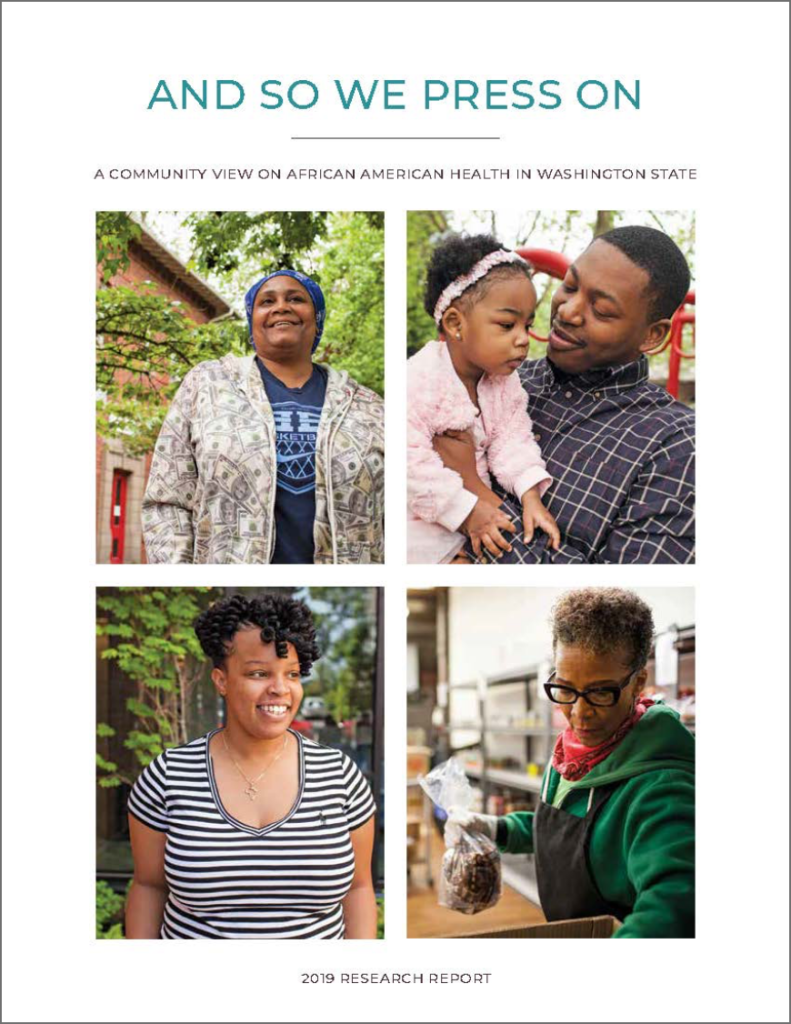 And So We Press On: A Community View on African American Health in Washington State explores the personal, social, economic, and environmental factors contributing to Black Washingtonians’ experiences of health and well-being. It is the third in a series of Black-focused reports to understand systemic barriers and community aspirations. The report has been critical to illuminating the diversity of Black perspectives across the state and spurring public dialogue on what’s needed to improve health equity. We appreciate Angela Powell and her company, Imago, for their research, as well as sponsoring organizations — the Urban League of Metropolitan Seattle and the Washington State Commission on African American Affairs.
And So We Press On: A Community View on African American Health in Washington State explores the personal, social, economic, and environmental factors contributing to Black Washingtonians’ experiences of health and well-being. It is the third in a series of Black-focused reports to understand systemic barriers and community aspirations. The report has been critical to illuminating the diversity of Black perspectives across the state and spurring public dialogue on what’s needed to improve health equity. We appreciate Angela Powell and her company, Imago, for their research, as well as sponsoring organizations — the Urban League of Metropolitan Seattle and the Washington State Commission on African American Affairs.
The Case for Investing in King County’s Black-led Organizations lifts up the many strengths of Black-led organizations, as well as investigates the barriers that have led to significant underinvestment in the Black community. The report is a call to do better, with recommendations for taking a culturally centered approach to philanthropy and building trust with Black nonprofit leaders. We were pleased to partner with Cardea Services on the research, and grateful to Seattle Foundation for financially supporting this report.
CLIENT ADVOCACY
In addition to our research, we continued to push for equitable changes to policy, like Washington’s Temporary Assistance to Needy Families (TANF) program. Over the last decade, the state has cut over $220 million from TANF, resulting in tens of thousands of families losing basic support. What’s more, Black and Indigenous families have been disproportionately kicked off TANF at higher rates than other racial groups.
To inform policy change, we interviewed our clients to better understand their needs and the barriers they face, including Bryttni in the client spotlight. We then elevated their voices with policymakers to reverse the harsh policies enacted in the last recession and secure more funding for families. Newly adopted changes have also broadened the definition of homelessness for TANF time limit extensions, allowing families who are in temporary housing to continue receiving support. We are now pushing for extensions of current COVID-19 waivers and expanding TANF time limit hardship criteria to include Washington state residents who are experiencing a declared state of emergency.
CLIENT SPOTLIGHT
BRYTTNI SEALS
Bryttni is a Seattle-based massage therapist, reiki practitioner, business owner, wife, and mother of two young children. Prior to her current role in the healing arts, she had a career as a medical office professional, and Byrd Barr Place was pivotal to her advancement.
CLIENT SPOTLIGHT
BRYTTNI SEALS
Bryttni is a Seattle-based massage therapist, reiki practitioner, business owner, wife, and mother of two young children. Prior to her current role in the healing arts, she had a career as a medical office professional, and Byrd Barr Place was pivotal to her advancement.
Securing Our Legacy
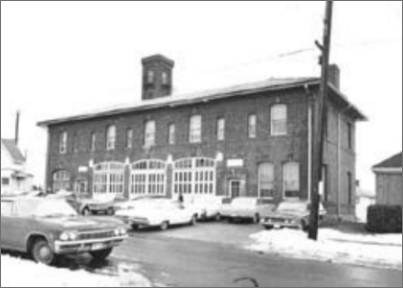 The civil rights era of the 1960s spurred the creation of our organization by a group of concerned citizens. Black pastors, Jewish rabbis, and everyday residents came together to respond to the needs of our neighbors who were living at the intersection of racism and poverty.
The civil rights era of the 1960s spurred the creation of our organization by a group of concerned citizens. Black pastors, Jewish rabbis, and everyday residents came together to respond to the needs of our neighbors who were living at the intersection of racism and poverty.
After our original offices were firebombed, we moved into the Central District’s Firehouse No. 23 in 1968. Since then, the building has created a sense of home and belonging for the Black community, clients, and neighbors. It has been a place where people could visit to get their basic needs met, whether it be food, housing assistance, or other community resources. It also has been a safe space for Black leaders to step into their highest potential and evolve the vision and realities for the Black community.
To continue the organization’s legacy and commitment to the Black community, as well as with other ethnic and cultural groups — Chinese, Vietnamese, Latino, Russian, Ethiopian — who are part of the Central District neighborhood today, Byrd Barr Place has embarked on a journey to renovate its historic building.
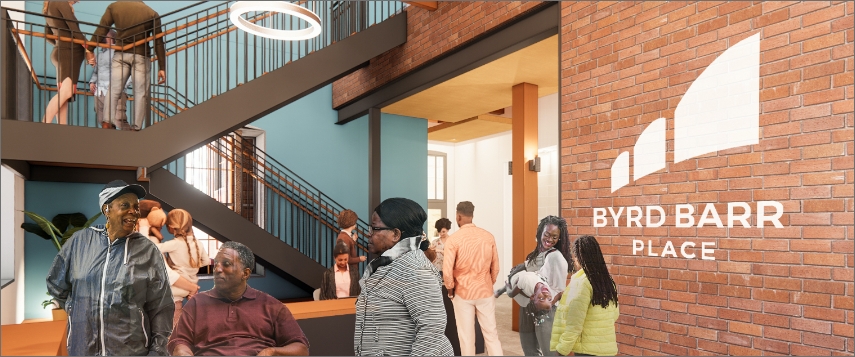 After a decade-long negotiation with the City of Seattle, we’re proud to have finally secured the deed to our historic firehouse home in October 2020. Gaining ownership of Firehouse No. 23 also unlocked the ability to secure critical funding sources.
After a decade-long negotiation with the City of Seattle, we’re proud to have finally secured the deed to our historic firehouse home in October 2020. Gaining ownership of Firehouse No. 23 also unlocked the ability to secure critical funding sources.
Our building renovation brings with it new and exciting opportunities to reimagine the next 55+ years of serving communities. We are making the building more accessible to all, with a welcoming entryway, installing an elevator lift and improving safety through seismic retrofits and upgrading HVAC, plumbing, fire suppression and electrical systems to bring them up to code.
We’re creating a grocery store experience in our food bank, shifting to a market model where people can select the items they want and feel treated with dignity and respect. We’re improving the office space to meet with clients and expanding gathering spaces for our community. Through it all, we’re preserving Black heritage, celebrating local history with art and interpretive displays, and fortifying our building that has been our homestead, our cultural anchor since the civil rights era.
Because of You
Our connection with people and our community defines Byrd Barr Place. It’s because of all of you that we’re able to carry forward our vision and mission — supporting strong communities, where all people have the opportunity for health, well-being, and prosperity. Our gratitude to the staff, volunteers, donors, and community partners who are Byrd Barr Place and help make what we do possible.
OUR COMMUNITY OF SUPPORT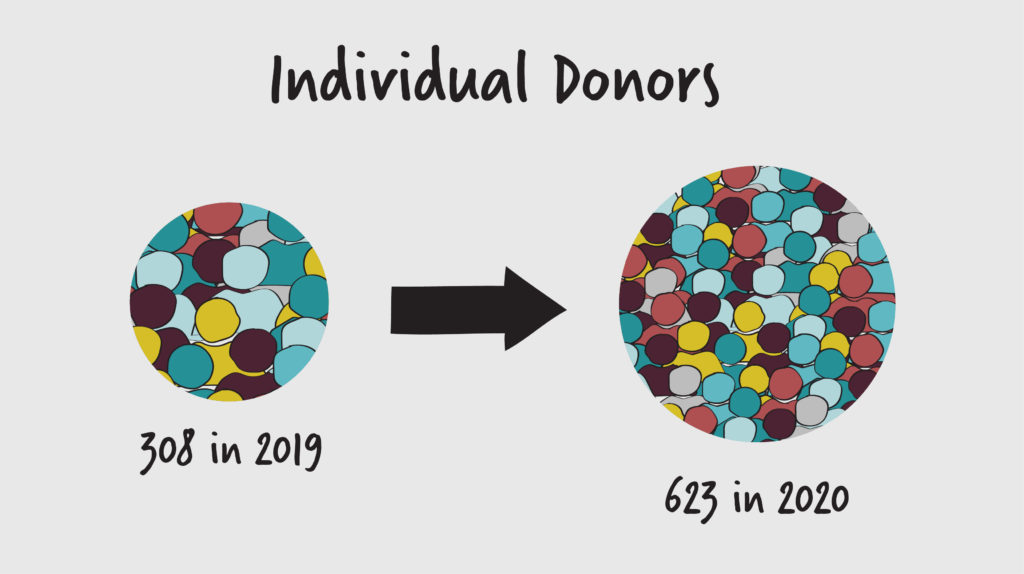
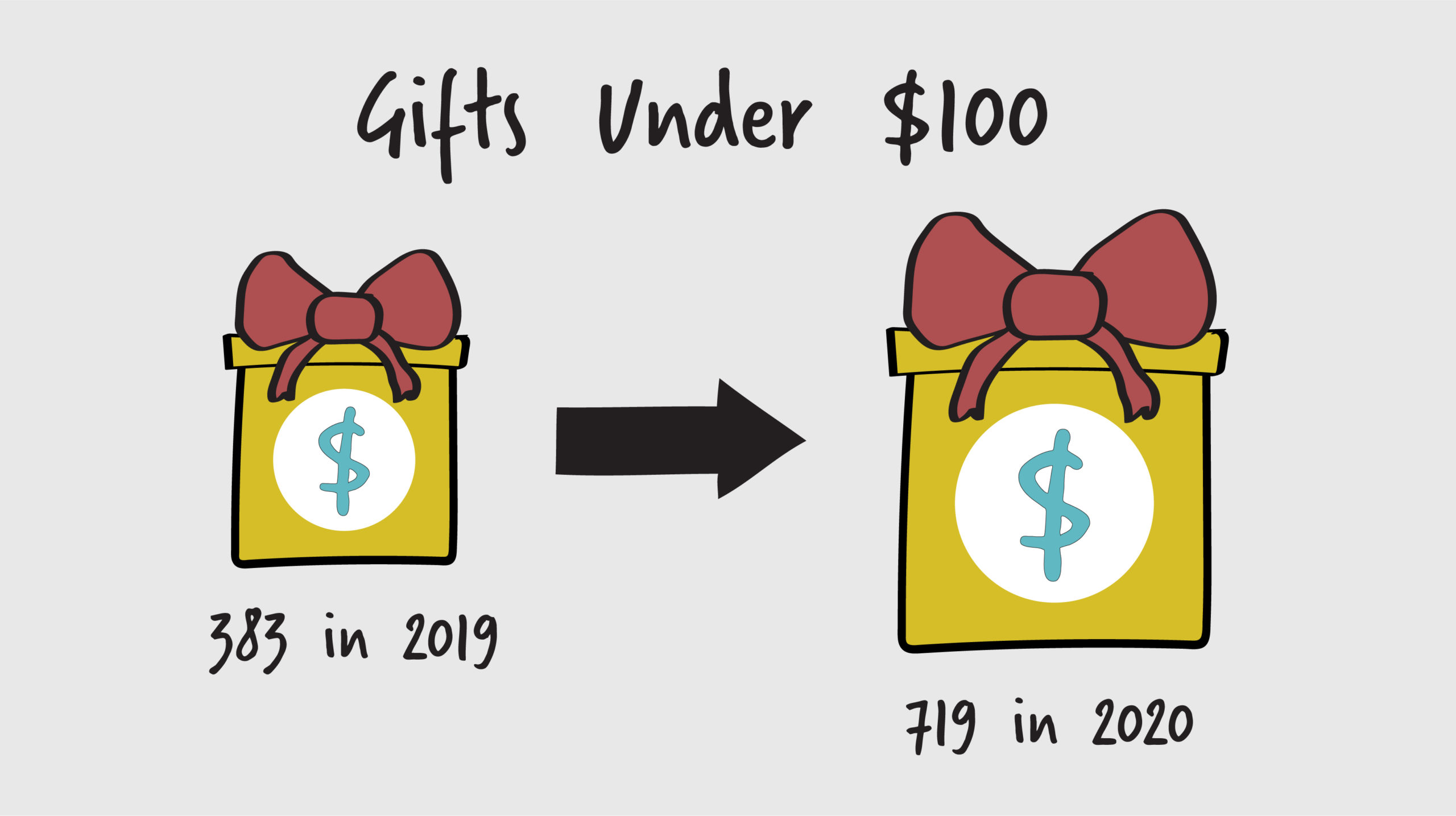
OUR IMPACT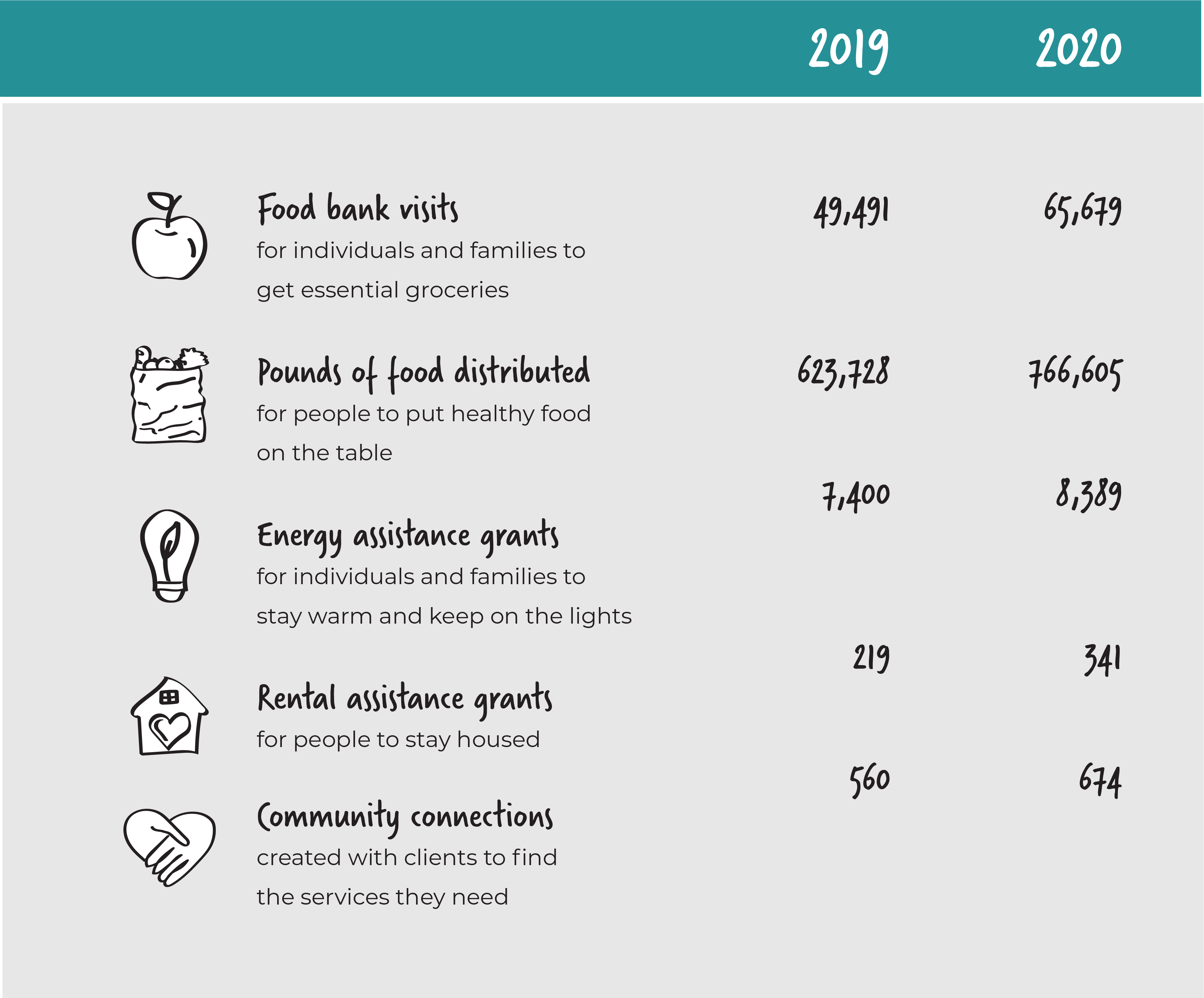
FINANCIALS
At Byrd Barr Place, we maximize every dollar to provide essential services and to advance equitable opportunity. The following financial statements, reports, and schedules are in accordance with government auditing standards and required by the uniform guidance for years ending Dec. 31, 2019 and 2020.
